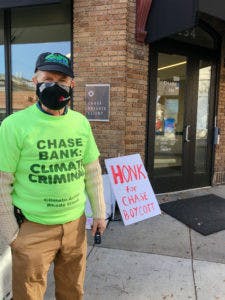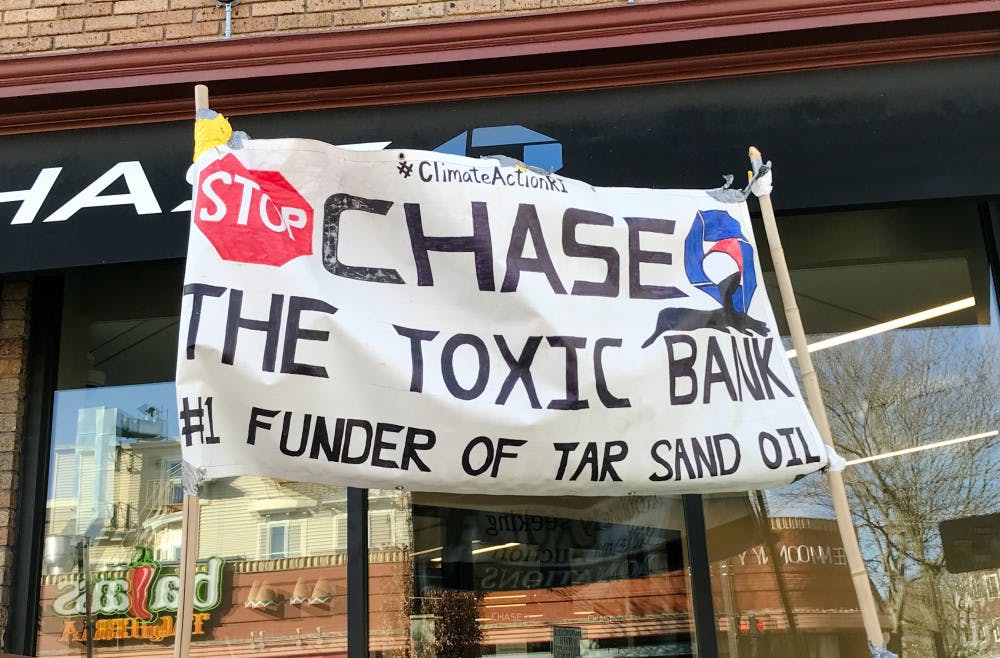Protesters demanded JPMorgan Chase divest from fossil fuels during a demonstration outside the Chase Bank on Thayer Street Monday morning, the latest in a series of protests of the bank organized by activist organization Climate Action Rhode Island.
Attendees of the protest, which began at 11:30 a.m. and had dispersed by 1 p.m., called for the bank to both divest from fossil fuels and increase investment in renewable energy. Brian Wilder, who coordinates protests against Chase for CARI, told The Herald that the bank is “profiting off the destruction of the environment and the planet.”
JPMorgan Chase invests roughly $65 billion a year in fossil fuels, according to Wilder. Though the bank announced $1 billion in bonds for investment in green projects in September, Wilder said that any investment in green energy by the bank is dwarfed by investments in non-renewables.
According to spokesperson Carolyn Evert, JPMorgan Chase is encouraging corporate clients to “align with the Paris Agreement and work toward global net-zero emissions by 2050.” JPMorgan has also pledged to “invest in technologies that help reduce carbon emissions and will work with clients on ways that they can reduce their own carbon footprints,” Evert wrote in an email to The Herald.
The firm is committed to using renewable energy for 100 percent of its power needs by the end of the year, Evert added.
Despite Chase’s commitments, activists remain skeptical that much will improve. “They keep saying they're going to make a change and get off of fossil fuels,” Wilder said, but he has been disappointed with their actions.
JPMorgan has been the top contributor to fossil fuel industries among banks, according to the Banking on Climate Change 2020 report. The bank has contributed $268 billion to non-renewable firms over the past four years, the report said.
Wilder said he believes that it is vital that the bank stop investing in exploration projects for fossil fuels. “If the banks stopped lending (for exploration), fossil fuel expansion would grind to a halt,” he said.

Protesters parked their signs in front of the Chase location on Thayer Street. A large banner duct-taped to bamboo poles read “Stop Chase, The Toxic Bank.” Beside the text was a hand-drawn image of a barrel of oil spilling through the Chase logo.
The protesters wore neon green shirts printed with “Chase Bank: Climate Criminal.”
Despite their colorful apparel, protesters painted a dire picture of the future if emissions are not curbed. Wilder predicted that if nothing changes, 80 years from now half of Providence will be underwater, wildfires will spread and millions of animal species will be lost.
“It’s going to be a very unstable world,” Wilder said.
Suzanne Stack, 62, who was protesting Monday for the first time with CARI, said that she had already noticed the effects of climate change. Stack, who frequently swims in the ocean, said that she has seen dolphins in colder waters than ever before and that she often picks up trash in the ocean while she swims.
“It’s here and now, not in the future,” said Roberta Kaufman, 68. Kaufman has been protesting for climate change for years, she said, adding that she was at the 2014 People's Climate March in New York City.
The protest Monday was the latest in a campaign by CARI against Chase Bank. Activists from the group protested at the Thayer Street location in September and have protested at bank branches around the state. Chase announced Sept. 2019 that it would open 12 locations in Rhode Island over the next several years.
In January, CARI held a die-in protest — during which protesters laid down on the ground with cardboard gravestones, demonstrating their vision of our future because of climate change — at the Thayer Street location, The Herald previously reported.
Though it was her first protest with CARI, Stack said she is a lifelong activist. She recalled drawing what she described as “anti-war pictures” at the age of 10. Even later in life, Stack remained keyed into the anti-war movement as her brothers-in-law fought in the Vietnam War.
“I’ve always been involved in one way or another,” Stack said. “This is the latest fight for me.”
The fight for action on climate change is “for my nieces and nephews, their grandkids,” Stack said, “for everyone’s grandkids.”
Wilder expressed a similar sentiment: “It’s for my children and my grandchildren,” he said.
Correction: A previous version of this article stated that Suzanne Stack's brothers fought in the Vietnam War. In fact, her brothers-in-law fought in the Vietnam War. The Herald regrets the error.

Ben Glickman was the 132nd editor-in-chief and president of The Brown Daily Herald. He previously served as a metro editor and oversaw the College Hill and Fox Point beat, in addition to writing and editing about city politics, COVID-19 and the 2020 election. He is the co-creator of the Bruno Brief, The Herald's first news podcast. In his free time, he is passionate about birds (also tweeting) and eating way too spicy food.





